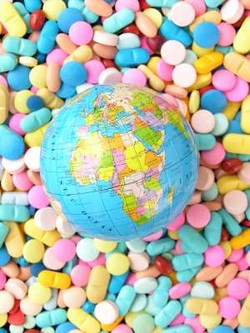 Three Nigerian drugmakers have received the Good Manufacturing Practice (GMP) certification from World Health Organization, raising the prominence of the Nigerian pharmaceutical industry in a global perspective.
Three Nigerian drugmakers have received the Good Manufacturing Practice (GMP) certification from World Health Organization, raising the prominence of the Nigerian pharmaceutical industry in a global perspective.
The WHO certified Evans Pharmaceutical, May & Baker Pharmaceutical and Chi Pharmaceutical to produce international drugs within their native Nigeria. The firms join Swiss Pharma Nigeria, which was the first to receive a GMP certification earlier this year.
The Director General of Nigeria's National Agency for Food and Drug Administration and Control (NAFDAC) - Paul Orhii - recently attributed the problem of drug counterfeiting in Nigeria to low domestic production of medicines, as well as porous national borders and a lack of awareness about the dangers of buying dubious medicines among the general public.
In 2012, NAFDAC established a $1.3bn fund to provide low cost loans for companies building. Expanding or upgrading domestic production facilities.
The certification of Nigeria's first companies is a major milestone for the country and a step forward not only for the supply of quality medicines in the domestic market, but also providing drugs to export, for example to neighbouring African nations that are also afflicted by the counterfeit medicines trade.
With 150m people Nigeria also has potentially a large domestic pharma market, although it was valued at just $1.3bn in 2013, according to Business Monitor, which expects it to grow around 15 per cent this year.
WHO recognition allows the drugmakers to participate in international drug supply bidding exercises sponsored by global development institutions. But with this new power comes responsibility and analysts say the world will now have higher expectations from the Nigeria's pharmaceutical industry, particularly for those drugs moving out of the country.
Onyebuchi Chukwu, Nigeria's health minister, says: "The world now awaits products such as artemether-lumefantrine tablets for malaria, lamivudine tablets for HIV/AIDS, levofloxacin tablets for tuberculosis, zinc sulphate tablets for treatment of diarrhoea, fluconazole injections, ciprofloxacin tablets and many more made-in-Nigeria drugs to be pre-qualified by the WHO soonest.
"The companies in question will now begin to compete with pharmaceutical firms the world over in international bidding processes for medicines supplies."
Chukwu added that Nigeria's federal government would consider "certain incentives" such as tax breaks and an increased level of funding in order to enable the newly-certified local drug firms to recoup their expenditure (of about $600,000).
Nigerian pharmaceutical firms have been expanding operations in recent years, introducing new methods in product packaging and improving plants – all with a view to obtaining the WHO pre-qualification that enables them compete in the global market.
The country has been attempting to make inroads into lowering the risk of counterfeit medicines, something that has plagued the country for years, and created a stigma around the country's pharma industry.
To help combat this in July, Nigeria's medicines regulatory authority started enforcing a requirement for antimalarial and antibiotic drugs to deploy a text message-based authentication system to ensure they were genuine.
The country has also rolled out Thermo Scientific's TruScan counterfeit detection technology in dozens of states across the country to screen border points, pharmacies and retail outlets for counterfeit drugs.
The latest GMP certifications are also an important step towards increasing its integrity, although experts caution that encouraging a domestic drug manufacturing industry will not be a realistic proposition for many countries.
Speaking at the Global Forum on Access to Safe Medicines in London, UK, earlier this year, economist Roger Bate of the American Enterprise Institute (AEI) told delegates that setting up a domestic pharmaceutical sector is not necessarily advisable, as the medicines made by these companies are likely to be expensive and may not meet the quality standards of imported, genuine drugs.
"Economies of scale mean locally-produced drugs are nearly always more expensive than import drugs [and] the quality is more variable," said Bate. There is also no guarantee that counterfeiters will not start to target domestic brands, particularly if prices are high.
The lack of regulatory governance also makes the generation of an in-house pharma industry difficult in many countries, and Nigeria is something of an exception thanks to the strenuous efforts to deal with poor-quality drugs by NAFDAC, initially under the late Dora Akunyili - who sadly passed away in June - and latterly under Dr Orhii.
NAFDAC accepts however that it does not have the staffing levels to do proper assessments of all locally-produced medicines, writes Bate in 2012 book Phake.
©
SecuringIndustry.com




 Three Nigerian drugmakers have received the Good Manufacturing Practice (GMP) certification from World Health Organization, raising the prominence of the Nigerian pharmaceutical industry in a global perspective.
Three Nigerian drugmakers have received the Good Manufacturing Practice (GMP) certification from World Health Organization, raising the prominence of the Nigerian pharmaceutical industry in a global perspective.